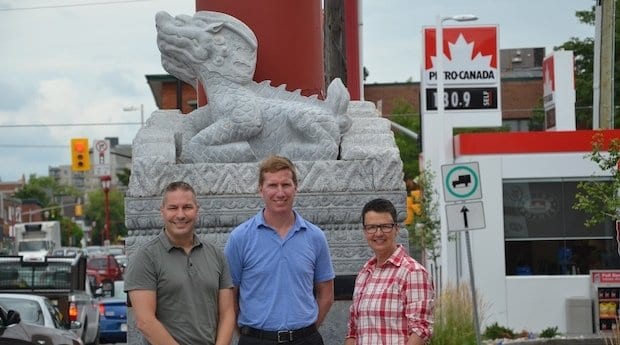Ottawa goes to the polls Oct 27 to elect a new municipal government. Residents of Somerset West (Ward 14) have an interesting choice ahead of them, as three of the seven candidates running for the ward’s city council seat are openly gay.
Jeff Morrison, Denis Schryburt and Catherine McKenney are all vying for the spot being vacated by Councillor Diane Holmes. Holmes announced her retirement earlier this year.
Xtra sat down with the candidates on July 30 to get their take on some of the key issues facing Somerset Ward and the downtown LGBT community. In the second of a three-part series, the candidates explore the issue of LGBT youth homelessness and how cycling infrastructure affects how we all move around the city.
Xtra: What are your thoughts on LGBT youth homelessness in Ottawa and how we can start reducing it?
Jeff Morrison: Well first of all, I would not do what Rob Ford just did and be the only [member of city council] to vote against a homeless shelter for LGBT youth. That was disgraceful.
The evidence is pretty clear that homelessness does affect LGBT youth more than, say, straight youth. There needs to be put in place the services, the social services, the housing services needed to address that problem. That’s why some of the great programs and organizations that exist, we need to continue funding. Youth Services Bureau (YSB), PTS, Centretown Community Health Centre — those are all important pieces of the puzzle to addressing that problem.
The other thing is, on the more direct issue of housing, something I’ve been calling for and put in my platform I released a couple weeks ago was looking at what cities like Calgary and Salt Lake City, Utah, have done, which is implement what they call a housing-first approach.
It’s very similar to what Ottawa is already doing with its 10-year homelessness strategy, but it’s a lot more complex in terms of the partners it brings to the table, and in particular with respect to LGBT youth. If you can bring the right partners that involve a social services agency such as YSB in particular, such as PTS, to look at the issue of housing first from a gay and lesbian perspective, I think you can develop more targeted solutions that would impact that population that is clearly needing it.
Denis Schryburt: I used to be president of PTS and I’ve done some work for YSB, so absolutely, we need to fund those organizations — they do amazing work. I think PTS can be fixed a little bit because it’s a little bit of a mess right now. Don’t get me wrong: PTS is a great organization. It has done some great work in the past, and I think it can do some great work in the future. It just needs a reorganization of some sort. So I think the city should be working with PTS to reorganize that organization.
[PTS] has the Pink Triangle Youth group, which as president I sat in on many of those [sessions], and that’s what they need. They need more space, more time and some more programs that PTS can produce. They’re just not there yet as they were in the past.
YSB absolutely . . . they do incredible work. They’ve revamped the building now downtown, but I think they need to be able to expand. Our children aren’t just downtown; they need to have little satellite offices here and there so that people can — sometimes they can just escape their homes for a little bit. So they need someplace close where they can go to get whatever help they need . . . and our telephone service as well; funding is definitely required.
Catherine McKenney: [The City of Ottawa] has invested $14 million a year into housing and homelessness, and some of that is targeted towards youth, and obviously some of that flows to LGBT youth. But I think it’s important, and I agree, we have great organizations that do work in our community. YSB obviously is the leader in terms of housing and homelessness with queer youth. But I think it’s time that we step back. The City of Ottawa has changed a lot over the last 20, 30 years . . . and you know, our agencies [are] still serving that cross-section of the community.
Are our services being delivered in the way that they need to be? I don’t think that we’ve done recently enough the data collection to look at who are we servicing? How has that changed? And in terms of youth, do we need to look at how we house queer youth, how we house youth in particular coming from the rural areas? Do we have that data that will support that, and across all services? I don’t just mean in housing and homelessness but across all services.
I think we need to go out and we need to find out and make sure that the funding that we’re putting into our services are targeting who we need to, and I believe that we will see a requirement for more housing money for youth.
What are your thoughts on bike lanes in the city? Where do we need them, and how much funding should be allocated to cycling infrastructure?
CM: I’ve been cycling year-round most of my adult life . . . people are now — there are more people cycling even in the winter, and I cycle through the downtown in the winter with my goggles and helmet on. But I will not cycle down Bronson. Even today I wouldn’t — on a beautiful, sunny day I won’t cycle down that street. I cycle down Somerset; there are streets where I feel comfortable, but in terms of bike lanes I think that we have a transportation master plan, and there was money that was dedicated for cycling: $70 million dollars. But that’s over many, many years. I’d like to see that $70 million spent in the next term of council. And I would like to see us move ahead.
We’ve got a once-in-a-lifetime opportunity . . . with LRT to change the way we move around the city. So you take the $70 million and you do that, you know, you build the bike lanes. We’ve got O’Connor; Rochester is slated to become a complete street, but it’s not going to be renewed for 20, 30 years. Let’s take paint, put it down, put up some planters; it’s not going to make the street less safe.
We have a coroner’s report that’s told us that over 30 kilometres per hour, if you’re in traffic, the only way that you’re literally safe is if you have segregated bike lanes. So we need segregated bike lanes; we need them through the city, east to west.
JM: So I’ll say four things. One is, you’ve just got to better maintain what you already have. It’s ironic that we’re sitting right here on Somerset and I’m looking out here where technically . . . it is a bike lane. And yet, could you tell? I biked here about a week ago, and I was looking for any of the paint on the road that indicates it’s a bike lane, and most motorists here wouldn’t even know that this is a bike lane. So you need to better maintain the network that you already have. Sometimes it’s as simple . . . as repainting the lane that’s on the street.
The second is, put better connections between bike lanes, particularly at intersections . . . There’s nothing there at intersections; [for instance] at Somerset, there’s no indication. So when you’re trying to cross over, you’re essentially at the whim of motorists because there’s no clear indication that those connection points exist.
The third thing, in terms of expansion of the network . . . [is] again, as part of any redevelopment of an existing street, taking the complete-street philosophy. It should include . . . provision for bike lanes.
The last point I’ll make on not just bike lanes, but cycling in particular . . . is I’ve seen, and I’ve heard of many instances where cyclists don’t always obey the rules of the road . . . I do think in all fairness that if we are to see an expansion of cycling, this is what we want — and the reasons why it’s beneficial are numerous. We do need to ensure that cyclists are obeying the rules of the road, just like any other use of the transportation network. I don’t think we should expect anything less.
DS: I think this is definitely an issue that all of us agree on the different aspects. The city is definitely infamous for their 10-year plans and 20-year plans and so on, so I agree with Catherine that sometimes you need to . . . put your foot down and say, “This is when we’re going to get it done.”
Definitely, I think some education between both drivers and cyclists. I mean, I’ve seen many times, walking downtown . . . cars stop at a red light, and cyclists coming in between the cars and the curb and having to put their foot down because it’s so tight trying to get in front of that row of cars. I just think it’s so dangerous, and one slip and next thing you know, the driver is responsible.
I’m not saying it’s all cyclists’ fault — absolutely not. Everybody needs to learn to share the road, and that’s critical, so we need that education out there . . . I think that we need to teach our kids at an early age how to ride a bike and how to respect the rules of the road.
Click to read parts one and three of Xtra’s interview with the candidates.
The Ottawa municipal election takes place Mon, Oct 27.
For more information, visit
ottawa.ca
jeff2014.ca
catherinemckenney.ca
denisschryburt.ca


 Why you can trust Xtra
Why you can trust Xtra


